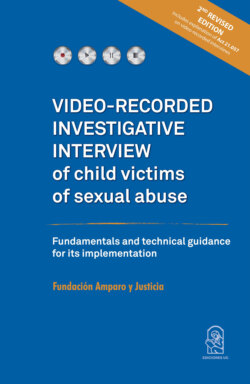Читать книгу Video-Recorded investigative interview of child victims of sexual abuse - Fundación Amparo y Justicia - Страница 5
На сайте Литреса книга снята с продажи.
FOREWORD
ОглавлениеIt was an honor for me to be invited to write the foreword of the second edition of this book. Seeing the implementation of the Video-Recorded Interviews Act in Chile, and its potential to diminish the secondary victimization of children who have been exposed to serious crimes, has given me great satisfaction. I never thought I would have the opportunity to participate in such an important project and am grateful for having been able to contribute to this enormous effort made by so many people.
The main objective of this Act is to ensure that child victims of sexual abuse and other serious crimes are treated in accordance with their particular needs and characteristics when they come into contact with the criminal justice system. Considering these factors helps to prevent additional harm beyond that initially caused by the offense.
Until now, victims were forced to repeat their statements many times, which caused them to suffer. It made them question whether they were believed or not, and often led them to recant their statements. Imagine if we had to recount the precise details of our last sexual experience over and over again to several strangers! Something similar is what we demanded from children, who hardly had the maturity and vocabulary to be able to understand and describe what had happened to them against their will.
The video-recorded investigative interview is an internationally validated technique designed to collect more detailed and better-quality information during the child’s testimony, which might in turn avoid bias and contamination of the account. This higher-quality information can then be used to guide the investigation and subsequent ruling on the case more effectively.
The successful implementation of Act No. 21,057 depends not only on the Act’s merits, but also on providing the necessary number of properly trained interviewers to conduct adequate interviews. For me, the most impressive aspect thus far has been the progress and effort made by the institutions and individuals involved to reach appropriate standards. However, further work is still needed, as academic research indicates that ongoing training is essential if the Act is to be maintained over time and achieve its objectives.
Of course, there are still challenges, but I am confident that they will be overcome, as I have witnessed an understanding of the necessity of this reform to one day achieve the full respect of children’s rights in Chile.
I recommend this book as a knowledge base for all those who wish to learn about this investigative proceeding, its foundations, and how it modifies the current criminal procedure in Chile. It will also be a useful tool for actors in the criminal justice system who wish to understand how their role will be affected by the application of this Act.
I wish you all success; all of your efforts will be worthwhile.
Nick Quine
Retired Sergeant, Avon and Somerset Police, United Kingdom
Video-recorded investigative interviewing teacher and teacher instructor
